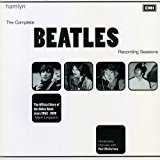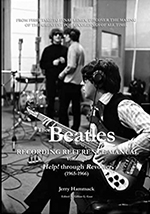Part of
Recording "Sgt. Pepper's Lonely Hearts Club Band"
Nov 24, 1966 - Apr 20, 1967 • Songs recorded during this session appear on Sgt. Pepper's Lonely Hearts Club Band (UK Mono)
- Album Songs recorded during this session officially appear on the Strawberry Fields Forever / Penny Lane 7" Single.
- Studio:
- EMI Studios, Studio Two, Abbey Road
Timeline
More from year 1966
Spread the love! If you like what you are seeing, share it on social networks and let others know about The Paul McCartney Project.
About
On November 24, 1966, The Beatles were back at EMI Studios, Abbey Road, to start recording their next single and album. After eight days (or nights) in the studio, they had only worked on two tracks, John Lennon’s track “Strawberry Fields Forever“ and Paul McCartney’s song “When I’m Sixty-Four“. On this day, they continued working on those two tracks.
For “When I’m Sixty-Four“, George Martin had written an arrangement for two clarinets and a bass clarinet. On this day, three clarinettists were brought in and added George Martin’s score to Take 4. As these were top studio musicians, the session was completed in just two hours, from 7 to 9 pm.
As was usual for a McCartney song, there were extensive discussions with George Martin about arrangement. Paul kept saying that he wanted the song to be really “rootie-tootie,” so George suggested the addition of clarinets. The clarinets on that track became a very personal sound to me; I recorded them really close up, bringing them so far forward that they became one of the main focal points.
Geoff Emerick – From “Here, There and Everywhere: My Life Recording the Music of The Beatles“, 2006
[Paul] said he wanted “a kind of tooty sound”. So I scored it for two clarinets and a bass clarinet. I remember recording it in the cavernous Number One studio at Abbey Road, and thinking how the three clarinet players looked as lost as a referee and two linesmen alone in the middle of Wembley Stadium.
George Martin – From “All You Need Is Ears“, 1979
Paul got some way round the lurking schmaltz factor by suggesting we use clarinets on the recording, ‘in a classical way’. So the main accompaniment is the two clarinets and a bass clarinet, which I scored for him. This classical treatment gave added bite to the song, a formality that pushed it firmly towards satire. Without that, the song could have been misinterpreted — it was very tongue-in-cheek. It is rather like, say, putting a Gerald Scarfe cartoon into a gilded frame, and hanging it in the National Gallery. The form brings you up short, makes you think more carefully about the content.
George Martin – From “With A Little Help From My Friends: The Making of Sgt. Pepper“, 1995
George helped me on a clarinet arrangement. I would specify the sound and I love clarinets so “Could we have a clarinet quartet?” “Absolutely.” I’d give him a fairly good idea of what I wanted and George would score it because I couldn’t do that. He was very helpful to us. Of course, when George Martin was sixty-four I had to send him a bottle of wine.
Paul McCartney – From “Paul McCartney: Many Years from Now” by Barry Miles, 1997
There are some very clever touches in the arrangement, beginning with the fact that the second clarinet enters during the introduction before the first clarinet. There are three verses to the song; the clarinets outline and reinforce the chords, with characteristic flourishes to add musical interest. The first two verses are straightforward, but on the third, the players are allowed to open up with some of their own jazz inflections. During the chorus (“Will you still need me,” etc.), an interesting texture is achieved when the two clarinets play legato quarter notes while the bass clarinet plays staccato quarters. Although the music was recorded in C major, the released version was changed to D-flat major by speeding up the tape.
[…] For the clarinet trio of “When I’m Sixty-Four,” three of England’s best reed players were hired: Robert Burns and Henry MacKenzie on clarinets, and Frank Reidy on bass clarinet. The musician contractor for the EMI Abbey Road Studio at that time was probably Laurie Gold. He would have used these three often before and knew that they were the top session players available. […]
From Rock ’n’ Roll Clarinets?! The Beatles’ Use of Clarinets on Sgt. Pepper’s Lonely Hearts Club Band – The Clarinet [Online]
From 9 pm to 10 pm, three mono remixes were made, the third being considered the best at this stage. More work to properly mix the track would be done on December 29 and 30.
From 10 pm to 11:45 pm, The Beatles added the last overdubs to “Strawberry Field Forever“ Take 26. John added more vocals, and Paul added a new piano line, wiping one of the vocal tracks recorded on December 15. Editing and mixing would happen on the following day.
Beatle songsmiths are back in full production again
The Beatle songsmiths are back in full production again, shaping the possible hits of 1967, writes a City correspondent. Mr. Dick James. the ex. crooner who is managing director of the Beatles music company -Northern Songs – said today: “Lennon and McCartney have prepared a batch of brand new songs. We hope some of them will be the hits of next year.” He also revealed the Beatles were at their recording studios and will be there for some weeks.
Some of the songs they are cutting will be in their new film. Two others are for a single record to be released next month.
This is a happy tune for shareholders in Northern Songs, whose shares have come down sharply. Mr. James is far from concerned about the break-in Lennon – McCartney songwriting activities – he knows that other artists, from Maurice Chevalier to the Irish Guards, have clamoured to record Beatles’ songs. Paul McCartney has recently written the theme music for Hayley Milll’s film “The Family Way.” Mr. James said : “We are just starting to exploit the two tunes receiving very great interest here and abroad. We have restricted sales abroad until the film is shown.“
Mr. James, it is believed, is confident that Northern Songs’ pre-tax profit for the year will not only meet his forecast of £700,000, a rise of £133,000 over last year’s figure, but exceed it comfortably.
From Liverpool Echo – December 21, 1966

Last updated on January 25, 2023
Songs recorded
1.
2.
3.
4.
5.
Staff
Musicians on "Strawberry Fields Forever"
- Paul McCartney:
- Piano
- John Lennon:
- Vocals
Musicians on "When I'm Sixty-Four"
Production staff
Going further
The Complete Beatles Recording Sessions • Mark Lewisohn
The definitive guide for every Beatles recording sessions from 1962 to 1970.
We owe a lot to Mark Lewisohn for the creation of those session pages, but you really have to buy this book to get all the details - the number of takes for each song, who contributed what, a description of the context and how each session went, various photographies... And an introductory interview with Paul McCartney!
The Beatles Recording Reference Manual - Volume 2 - Help! through Revolver (1965-1966)
The second book of the Association for Recorded Sound Collections (ARSC)-nominated series, "The Beatles Recording Reference Manual: Volume 2: Help! through Revolver (1965-1966)" follows the evolution of the band from the end of Beatlemania with "Help!" through the introspection of "Rubber Soul" up to the sonic revolution of "Revolver". From the first take to the final remix, discover the making of the greatest recordings of all time.
Through extensive, fully-documented research, these books fill an important gap left by all other Beatles books published to date and provide a unique view into the recordings of the world's most successful pop music act.
If we like to think, in all modesty, that the Paul McCartney Project is the best online ressource for everything Paul McCartney, The Beatles Bible is for sure the definitive online site focused on the Beatles. There are obviously some overlap in terms of content between the two sites, but also some major differences in terms of approach.




Contribute!
Have you spotted an error on the page? Do you want to suggest new content? Or do you simply want to leave a comment ? Please use the form below!